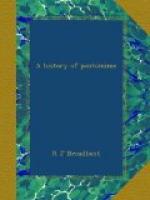In the sixth chapter of this work, in quoting Malone, I have mentioned that the Exodiarii and Emboliariae of the Mimis were the remote progenitors of the Clown of the Mystery Plays of this country. Now let us see what were the duties the Clown fulfilled in the old plays of this country, and also briefly of the others who were known under the generic name of Clown or fool.
In the early drama the Clown was a personage of no mean importance and whose duty was to preserve the stage from vacancy by amusing the audience with extemporary buffoonery, and also at the end of the performance. And, as Heywood, in his “History of Women” (1624), says “By his mimic gestures to breed in the less capable mirth and laughter.” On these occasions, it was usual to descant, in a humourous style, on various subjects proposed to him by the spectators; but they were more commonly entertained with what was termed a jig: this was a ludicrous composition in rhyme, sung by the Clown, accompanied by his pipe and tabor. In these jigs there were sometimes more actors than one, and the most unbounded license of tongue was allowed; the pith of the matter being usually some scurrilous exposure of persons among, or well known to the audience. Here again history repeats itself in this once more, and in imitation of the satirical interludes of the Grecian stage and the Atellans and Mimis of the Roman theatres.
The practice of putting the fools and Clowns in requisition between the acts and scenes (observes Francis Douce), and after the play was finished, to amuse the spectators with their tricks, may be traced to the Greek and Roman theatres; and their usages being preserved in the middle ages, wherever the Roman influence had spread, it would not, of course, be peculiar to England. The records of the French theatre demonstrate this fact; in the “Mystery of Saint Barbara,” we find this stage direction:—Pausa. Vadunt, et stultus loquitur. (A pause. They quit the stage, and the fool speaks). And in this way he is frequently brought on between the scenes.
It is quite obvious that the terms Clown and fool were used, though improperly, perhaps, as synonymous by our old dramatists. Their confused introduction might render this doubtful to one who had not well considered the matter. The fool of our early plays denoted a mere idiot or natural, or else a witty hireling retained to make sport for his masters. The Clown was a character of more variety; sometimes he was a mere rustic; and, often, no more than a shrewd domestic. There are instances in which any low character in a play served to amuse with his coarse sallies, and thus became the Clown of the piece. In fact, the fool of the drama was a kind of heterogeneous being, copied in part from real life, but highly coloured in order to produce effect. This opinion derives force from what is put into the mouth of Hamlet, when he admonishes those who perform the Clowns, to speak




